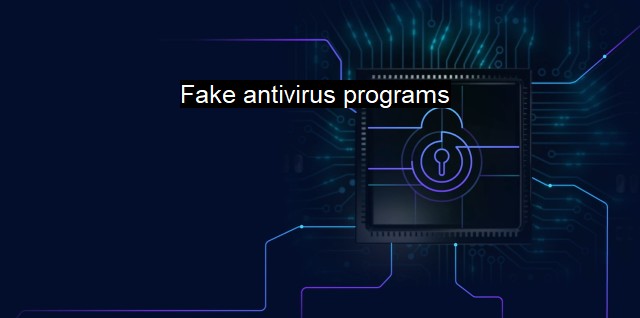What are Fake antivirus programs?
Uncovering the Truth: An Introduction to Fake Antivirus Programs and Their Impacts on Cybersecurity
Fake antivirus programs, often referred to as scareware or rogueware, represent a type of malicious software developed with the intention to mislead users into believing that their devices have been infested with multiple threats which can be eliminated only by purchasing and installing the supposedly useful software. These scams exploit the fear and confusion surrounding cybersecurity, causing significant damage to the personal and professional lives of targeted individuals, while swelling the coffers of cybercriminals.One primary distinguishing feature of fake antivirus programs is the misleading marketing tactics used for their distribution. Rogue software is typically pushed through bogus online ads or security alerts, which inform users of non-existent threats on their devices. These alarming messages are designed to appear legitimate and take the user on a panic-filled ride ending at the decision to purchase the "antivirus".
Rogue antivirus programs use various techniques to appear legitimate. They often take on official-sounding names patterned after established security software brands. Through fraudulent pop-up warnings, they concoct a pseudo-detailed analysis of the device's security health, sometimes even imitating the appearance of system messages. By convincingly mimicking genuine antivirus interfaces and functioning, they manage to instill a level of trust in their potential victims.
Even more alarming is that fake-antivirus programs employ controlling mechanisms over system operations to establish their authenticity further. Once installed, they interfere with current running processes, blocking genuine security applications, controlling browser actions, and overall hindering the functionality often resulting in a slow, unstable system. they may steer the potential victims toward phony customer service agents aiming to extract sensitive information, extending the potential harm beyond affecting the device's health.
Unfortunately, the scam does not stop after a victim pays the fee or subscribes to the service promised by the fraudulent antivirus. Once the online criminals have harnessed victims into making the payment, valuable personal information, such as credit card numbers or passwords, is collected exposed to the possible menace of identity theft.
The global cybersecurity community is continuously engaged in combating this fraud. End-user education continues to remain the most effective way to prevent such scandals, along with technical controls like legitimate antivirus installation, regular system updates and patches. Adding to that, recognizing the red flags including unsolicited pop-ups messages or unfamiliar software requesting administration rights aids in sidestepping being sucked into the scam.
Besides preventative tactics, reacting promptly when infected goes a long way in minimising further damage. Disconnecting from the internet, contacting tech support, removing the rogue software, and changing passwords which might be compromised should on the immediate to-do list if red flags are not caught beforehand.
In perspective, the phenomena of fake antivirus programs is multifaceted, blending elements of deceit, fear-mongering, and tech savviness to exploit unsuspecting computer users. Through dependency on digital devices, cyber fraud has developed into a prosperous undertaking. Therefore, it is critical to approach digital navigation with optimal alertness and invested defensive measures, acknowledge the profound negative impacts that being unprepared can have, and comprehend the insidious nature of silent cyber threats like rogue antivirus programs thoroughly. Cybersecurity isn't the buzzword that it is for nothing. It starts at the individual's consciousness and their willingness to make informed decisions to secure their virtual presence, helping to confront fake antivirus hazards with raised anticipatory shields.

Fake antivirus programs FAQs
What are fake antivirus programs?
Fake antivirus programs, also known as rogue security software, are malicious applications that masquerade as legitimate antivirus software, with the goal of tricking users into paying for a fake or non-existent malware removal service.How do fake antivirus programs infect a computer?
Fake antivirus programs can infect a computer through various ways, such as email attachments, software downloads from untrusted sources, or by exploiting vulnerabilities in outdated software.What are the signs of a fake antivirus program?
Some signs of a fake antivirus program include pop-up windows claiming that your computer is infected with malware, aggressive warnings and alerts, and requests for payment to remove the supposed malware. Another sign is if the antivirus program is unfamiliar or unrecognized by reputable sources.How can I protect my computer from fake antivirus programs?
You can protect your computer from fake antivirus programs by installing reputable antivirus software from trusted sources, keeping your operating system and antivirus software up-to-date, avoiding software downloads from untrusted sources, and exercising caution when clicking on links or opening email attachments. Additionally, never enter your credit card information in response to a warning from a suspicious antivirus program.| | A | | | B | | | C | | | D | | | E | | | F | | | G | | | H | | | I | | | J | | | K | | | L | | | M | |
| | N | | | O | | | P | | | Q | | | R | | | S | | | T | | | U | | | V | | | W | | | X | | | Y | | | Z | |
| | 1 | | | 2 | | | 3 | | | 4 | | | 7 | | | 8 | | |||||||